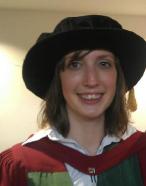Katherine Tonkiss
I completed my PhD thesis in early 2012, under the joint supervision of INLOGOV and the Department of Political Science and International Studies (POLSIS). I sat my viva in April of that year and shortly afterwards was interviewed for and gained a three year research fellowship at INLOGOV, working with Professor Chris Skelcher on the Shrinking the State project. A year into the post, this is a good opportunity to reflect on that transition from PhD to post-doc research.
In many ways, working as a Research Fellow on a three year project is similar to PhD study. I am completing a research project in a specified amount of time, with parameters and methods specified in a detailed research proposal. The goal of delivering the thesis in a timely fashion is replaced by the requirement to produce a set of research outcomes with which to wow the funders on completion of the project, and of course the need to publish, publish, publish never really changes.
Yet the transition from PhD to post-doc has also presented some new opportunities and challenges. One aspect is going from sole-authored thesis-writing to team working with colleagues both on the research project and beyond. While in reality I do have quite a lot of autonomy in my current role and the majority of my time is spent working alone on specific areas of the project, this project involves working with a team of five researchers split across three Universities. This kind of collaboration is now very common in academic research – and while it is step change from PhD research, I was quite pleased to enter a more collaborative environment.
Another challenge of the transition is balancing research priorities. I was told on numerous occasions during my PhD studies that researching and writing a thesis is something to really enjoy, because I would never again have the opportunity to immerse myself in my own research to such an extent. In reality, I have been really fortunate to be provided the time to turn my PhD thesis into a book, as well as having some time to pursue my other research interests separate to the project. However, pre-planning was key in achieving this – I had thought about a book contract before my viva was completed, and the three articles I have had published were all accepted before I started working as a Research Fellow. I also don’t think I would be so fortunate if I had the hefty teaching responsibilities which come with many junior academic roles.
The biggest difference between PhD and post-doc research is, though, the emphasis that is placed on ‘impact’ in the latter – that is, producing research that both advances academic knowledge and has a positive economic and societal impact. This impact agenda, while offering rewarding opportunities to engage in debates beyond academia, was challenging in terms of the transition from PhD to post-doc research – and particularly because my PhD was strongly theoretical.
For example, working on this research project has meant developing and maintaining relationships with partners in government and elsewhere, producing research outputs that are useful to them in their work in addition to being relevant to the overall objectives of the project. My colleagues at INLOGOV are very used to this way of working, but it really was a new experience for me after the PhD. Within a couple of months of starting my job, I found myself presenting to senior civil servants in Whitehall. Experiences such as this have allowed me to engage in discussion and debate far beyond the ivory tower, but they are a far cry from the late-night loneliness of thesis writing that I had become accustomed to.
Impact isn’t just about engaging with policy-makers, though. Throughout my PhD, I felt that I was researching and writing about something that I was really passionate about – which, I hope, is a common experience. This isn’t something that’s gone away now that research has become my day job – and indeed exploring intersections between normative ideas and lived experiences has become one of my core research interests. As much as there is a case for producing policy-relevant research in order to work with partners in government, it should also be recognised that research – in whatever discipline – is a tool with which to challenge dominant ideas and assumptions, and the ability to engage in the policy process and to communicate with different audiences in order to enact change is just as – if not more – important.
With the impact agenda now spanning all areas of academic research, it may be argued that it is more important than ever for PhD students to equip themselves with the skills to develop this kind of dual-facing work. I’m not decided on that – I think there can be excellent research without wider impact and these contributions are to be equally valued. However, the opportunity to see your research have an impact beyond academia can be very rewarding, and to that end developing those skills is really worthwhile.
Katherine Tonkiss completed her PhD in 2012, and is now a Research Fellow at INLOGOV. Her first book, Migration and Identity in a Post-national World, will be published later this year with Palgrave Macmillan. Her research interests are focused on the changing nature of migration, citizenship and democracy in a globalising world, the local experience of such transformations, and the intersection between normative and empirical research. Follow her Twitter feed here.

